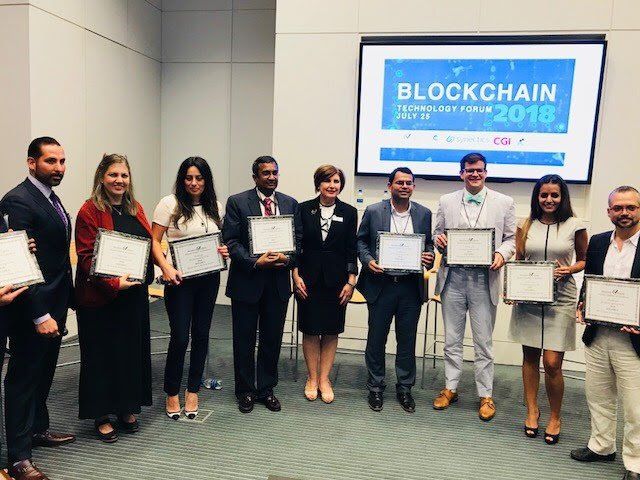Ten Business Tips for New Entrepreneurs in 2020
Nicole Martins Ferreira • January 2, 2020
Keep in Mind These Tips To Build a Business Like the Romans

Your first business is going to take everything you’ve got to make it a success. You’ll need your best idea, a strong work ethic, and perseverance for those days where things just don’t go your way. But that combo can help you turn your simple idea into an empire. In this article, we’re going to share 10 business tips that’ll help you launch a successful first business.
1. Build like the Romans
The Colosseum is 1949 years old. And for the most part it’s still fairly intact. The material it was built with was stronger than any concrete we use today. It’s beauty is so captivating that millions have flocked to Italy just to look at it in all its glory. The Romans used the best materials, purchased rare marble from other countries, and designed things that were built to last. But when it comes to building a business, there are many entrepreneurs who build for the short-term. They look at a business as a way to make an extra couple thousand bucks. Instead, they should be building something that’ll last for years to come.
2. Choose the right niche
The selection of the niche is where people often realize they’ve made a mistake. If you go too broad with a general business, you might struggle to know who your audience is. If you’re too specific with a barre class socks store, you might find your niche is too narrow. Not only that but there’s also a seasonality aspect. For example, if you’re obsessed with Christmas, you could build a Christmas business but you might struggle to find customers for your products in February. Another business tip to consider is whether you’ll be able to remarket to customers for years to come. For example, if you’re selling maternity clothing, women are only pregnant for nine months. After she gives birth, she likely won’t be shopping on that store anymore. So when it comes to deciding on a niche, choose a niche that’s popular year-round (Google Trends can show you how stable a niche is). You’ll also want to choose a niche that’s popular such as at least hundreds of thousands of monthly searches like fashion, beauty, fitness, or home decor. And finally, a niche that isn’t short-term so avoid maternity, weddings, or any niche business you won’t be able to build a long-term email list with.
3. Solve a burning problem
An important business tip for new entrepreneurs is to create a business that solves a problem. If you asked most failed business owners what problem they solved, they either can’t answer or the problem they solved wasn’t urgent enough. The problem you solve doesn’t need to be complicated like curing a disease. It can be simple, such as we help people overcome boredom by providing an entertaining experience. But ultimately, you need to know what you’re trying to accomplish with your business. By knowing what burning problem you’re solving, you can use that in your marketing to help people understand how you can help them best. For example, if you sell anti-snoring products, you’ll want your ad to show the frustration a snorer can have on a person’s sleep. And then showcase your product as the handy solution that’ll allow them to sleep through the night again.
4.Obsess over customer needs
One of the biggest sources of conflict in business comes from unmet needs. If a customer doesn’t get the service or product they were expecting, their needs won’t be met, and they’ll feel frustrated. The most important business tip when it comes to managing customer relations is to always empathize with the customer. When you recognize their frustration as pain from not having their needs met, it’s easier not to take the insults they hurl at you, personally. Instead, you can focus on trying to listen to what they say by mirroring the intent behind their words. And eventually, you work on coming to a resolution that meets their needs and leaves your customer feeling heard. By doing this instead of simply giving a refund, you open the doors to building a long-term relationship with them even if they were upset with their first experience with your brand.
5. Focus on profit instead of revenue
Most entrepreneurs are obsessed with revenue. “I made $900,000 in eight months,” they claim. And you can’t help but ask, “Did you really though?” Because digging deeper, you’ll often find that profit is much more important than revenue. Sure you made $900,000 in revenue but if your profit after eight months is only $10,000 was it really worth the work? And is that even sustainable? Probably not. Make the switch to transition from thinking about revenue to thinking about profit. The more profit you have, the more money you have to reinvest in your business, employees, and your own success. As an entrepreneur, you get paid last. Your startup expenses need to be paid first. So you’ll want to make sure you’re making more than enough money to treat yourself too. Check this https://www.oberlo.com/tools/profit-margin-calculator
6. Start with a narrow focus first and expand
Amazon didn’t start as the everything store. It started as a simple bookstore. And they slowly expanded into toys and other products as time went on to expand their business. That’s how you build a general business. One of the most important business tips is to always start with a narrow focus and expand into relevant verticals as you scale. By having a narrow focus, you can build a loyal audience who knows what to expect from you. It also gives you a well-defined audience to make your marketing easier. For example, you can start a women’s fashion store. At first maybe you sell apparel. But eventually you can expand into shoes, jewelry, fashion accessories, or beauty. Or you can go in a different direction and expand into men’s fashion and children’s fashion.
7. Focus on employee morale
The best boss I’ve ever had once told me that her secret to building a productive team centered around making her employees happy. And it was true. We celebrated something all the time. On my last day, I literally cried because I didn’t want to leave. I only left because I knew I had to step out of my part-time university job and gain more impactful marketing experience. I worked in that role eight years ago and still stay in touch with all my coworkers to this day. That’s how long-lasting the impact of employee morale is. Unfortunately, it’s often the one thing entrepreneurs fail to focus on. Most first time entrepreneurs try to act like a boss. And literally no employee wants one of those. Your employees want to feel appreciated, heard, and know that they’re on the right track. If you find yourself constantly criticizing people for not doing it your way, you’ll often find that team performance will drop. The most important business tip when it comes to managing employees is to make them happy. Because if you do that, they’ll be more willing to help you hit your company’s goals.
8. Start a business that matches your personality
According to serial entrepreneur Naval Ravikant, he believes that product/market fit should actually be founder/product/market fit. Essentially, what that means is no one else could run that business better than you. Ideally, you should start a business that matches your exact skills, experiences, and personality. This goes beyond doing your passion and actually doing what you’re destined to do. How can you contribute meaningfully to the world through your business? By doing something that only you can do, you can create a legacy that lasts while making an impact in the world. To sum up this business tip: start the business only you can start.
9. Always be aware of your competitors’ moves
Business can be cut-throat. Your competitors will always try to knock you down so that they can remain at the top. While you don’t want to obsess over your competitors you do always want to be aware of what they’re doing so you can stay ahead of the game. Which products and services do they offer? How do they market their brand? How do they price their products and services? How do they treat their customers? You need to find out every little detail in the early stages so that you know how to compete. If you find they offer a great product but terrible customer support, you can put a bigger emphasis on customer relations. The goal is to find out what their overarching weaknesses are and make those are your strength while still having a great collection of services and products for your customers. But remember, don’t obsess too much over the day to day of your competitors. Your obsession should center around your customers and employees. Make those two groups happy and you’re golden.
10. Just do it (even if it isn’t perfect)
The last business tip for new entrepreneurs comes from Nike, just do it. And I don’t just mean starting it. I mean get out of your head, stop overthinking, stop questioning whether you’re making the right call, and just do it. New entrepreneurs can sometimes be well on their way with their business only to have their thoughts cloud their mind. But that only delays your success. Will you make mistakes? You bet. Will there be challenges? Yup, and you’ll need to jump high to get over them. But isn’t this what you signed up for? Entrepreneurship is about going all in. It’s about taking big risks so you can live the life you want. The goal isn’t to win the award of perfection. The goal is to build a business that helps people solve a problem. And the sooner you can do that, the sooner you can make people’s lives better. That’s the impact your business can have on someone’s life. So the sooner you launch it, the more people you can help.

I know you don’t want to hear about how blockchain technology can fix elections, solve cold fusion, restore trust to America, bring global peace, and invent a new way to slice bread. I’m pretty tired of the blockchain hype cycle too, but if there’s one thing that proves current election technology is essentially trash, it’s the 2020 U.S. presidential election. Days later, we still don’t know for sure who won or lost, there are allegations about fraud or miscounts, and multiple legal challenges to the results already. Baseless or not, our current election process and technology invites challenge and provides fodder for conspiracy theories. “Trust compounds incrementally over time, very slowly, but it's lost instantly,” Tim Goggin, CEO of Australian election tech company Horizon State told me in a recent TechFirst podcast. “In an event like this you need to start looking at new solutions to start rebuilding that relationship between the people being governed and the people that are doing the governing.” Horizon State builds blockchain-based election technology that an Australian regional government has actually used in an election, so it’s not your typical blockchain vaporware. In addition, the company was selected as a World Economic Forum technology pioneer. According to Goggin there are at least four things required for visible and transparent election success. Accessibility is critical, especially during a pandemic. While mail is typically the cutting edge of election tech right now, it’s unreliable. People move. They’re on vacation. Mail isn’t tracked and traced. It gets delivered to the wrong address by mistake. One the other hand, the internet is what’s most accessible for the most people. Authentication is also critical. Mailed ballots are sometimes required to be signed by a third party, but not in all districts. Even if that’s done, what is to prevent fraud in this circumstance? Ballots cast in-person require identification, but election officials often spend as much time scrutinizing ID as a bouncer at a club. Security is a must, and although there is no such thing as perfect security in technology-based systems, when coupled with transparency and mutiply-redundant systems of record, you have accountability that is obvious. As much as blockchain is probably not a perfect solution for everything that it’s been touted for, this sounds right up blockchain’s alley. Theoretically, anyone can check the votes in a blockchain-based system, and audit any that look suspicious. There’s also permanence and resistance to hacking the results. Blockchain ensures that voting data can’t be altered to suit one candidate or another. “Once information is put onto a blockchain, it is extremely difficult or impossible to change afterwards,” Goggin says. “Imagine I walk into a restaurant ... and I scream really, really loudly: ‘My name is Tim.’ I walk off and then someone else walks in five minutes later and they go, ‘I heard some guy yelling before — what did he say?’ And let's say someone — lying — says ‘His name is Simon.’ You're going to have 29 other people in that room. They're going to go ‘No, no. He said his name was Tim.’” Protests Continue In Washington, DC As Presidential Contest Remains Undecided WASHINGTON, DC - NOVEMBER 06: People dance to Go-go music during a demonstration organized by Refuse ... [+] GETTY IMAGES “And if that person walked around the room, talked to everyone there, they're going to be pretty sure that the name was Tim and not Simon ... blockchains are essentially a database that is very hard to change and they are a way of agreeing on what the real state of history actually is.” Of course, getting from here — paper ballots, mail, and physical pieces of ID — to a future digital voting state is easier said than done. Secure digital ID is required, which many governments like Australia, New Zealand, are working on. Sweden has a digital ID initiative, as does Argentina. Malaysia, the Philippines, Singapore, and other countries have initiatives ongoing or solutions already launched, such as the e-KTP in Indonesia, which has been in existence since 2011. Individual U.S states are also working on identity technology including Oklahoma, often working with Real ID, which is Homeland Security’s identification protocol. Ultimately, the goal is that one day, everyone can cast their vote, have it immediately and accurately registered and tabulated, and anyone who has any concern about the reliability of any election can analyze every vote in almost real time. There are some challenges, of course. “Governments are often really slow to make changes,” says Goggin. “So it's just like very large enterprises.” To those who say digital voting is risky and we can’t take the risk of making a mistake, Goggin has a fairly immediate comeback focusing on this current U.S. election. “You've got a big one right there that could have been dealt with a lot better. We might be seeing more of these scenarios ... more and more of the everyday people are probably going to start saying to elected officials: we need to start looking at a new solution, a new way of doing this.” I won’t hold my breath. But perhaps in another decade or two long, drawn-out and disputed elections might be a thing of the past.

As COVID-19 continues to alter our way of life, it is of the upmost importance that we find time to pause, take a moment of reflection, and recognize those who are continually devoting hours of their time in the fight against COVID-19. To those serving on the front lines – who are risking their lives, to save the lives of the others – we say thank you. To those acting as a beacon of hope and providing sustained optimism for others in their communities, we say thank you. And to the many who are helping those directly impacted by COVID-19 through donations of any sort, we say thank you. As a part of our Client Stories – which will be published periodically throughout the coming weeks – we hope to highlight some of our admirable Clients, who have scarified their time and effort for the betterment of our society in the fight against COVID-19. “Money didn’t disappear or evaporate, money just moved,” explained Mrs. Susana Marino, Founder, President, and Chair of Northern Virginia’s Hispanic Chamber of Commerce. The Chamber is providing its members – primarily small businesses – with resources and guidance to get through COVID-19 and emerge as our countries newest and brightest leaders and entrepreneurs. Sited at Carr Workplaces Tyson’s location, the Northern Virginia Hispanic Chamber of Commerce – or more commonly abbreviated as the NOVAHCC – seeks to foster a variety of business and trade opportunities for its members and partners. From cultivating B2B (business to business) and B2G (business to government) opportunities, to promoting trade between international commodities, and to even providing potential career opportunities for its members and partners, the NOVAHCC strives for a better business climate in Virginia through the formation of a stronger economy on which these businesses can grow and develop. “Our chamber is looking to create bottom-line opportunities between buyers and suppliers,” explained Mrs. Marino. “While we have far fewer social gatherings than most chambers [because] we are more concentrated on producing results that are creating those interactions between buyers and suppliers.” “We invest our resources in technology or artificial intelligence, to connect our members with the target audience in perpetuity. That’s something that we do, over and over again,” she added. Although known as the Hispanic Chamber of Commerce, the Chamber welcomes members of all nationalities, ethnic backgrounds and gender. “We work with people of all backgrounds,” Mrs. Marino said. “That’s not even a question that you will find yourself having, where you are from, we don’t care. It doesn’t matter. The word diversity is really who we are – an international business, a community that creates opportunities for growth, here at home and beyond our borders.” But it is without question, that the Chamber’s mission of fostering trade and business in a diverse community has been altered due to the coronavirus. Primarily that of serving and aiding small businesses, a large makeup of the Chamber’s members, who have been severely affected by COVID-19. As she has always done, Mrs. Marino rolled up her sleeves and thought about how the Chamber could continue to provide the resources that her members need to brave these tough times. As the NOVAHCC has heavily invested in technology over the years, this has allowed the Chamber to provide its members with a variety of online modules that Mrs. Marino felt were underutilized in the past – which have now taken center stage because of COVID-19. “We were already planning for the future. We are still in the process of getting there so we’ve invested heavily in technology and it’s been available to us from day one since we opened our doors,” explained Mrs. Marino. “These programs that we have been delivering for over two years are now more relevant than ever.” “These programs were built by business owners for other business owners. They don’t come from a textbook, they don’t come from a university, it’s very practical. Every business owner that I have seen take our trainings, they have seen good results because we are speaking their language.” Along with offering modules to teach and assist businesses, the Chamber has synthesized a number of resources for its members which are directly available on its website. These include direct links for small business to access disaster assistance as well as steps these businesses can take to complete and apply for a U.S. Small Business Administration Loan. Along with providing technical resources for her members, Mrs. Marino offered emotional sentiments throughout her discourse – emphasizing the understanding she had of the challenges that so many of her members are currently facing. When examining these difficulties, Mrs. Marino looked to the future and posed the question of, “How do we put people back to work [after COVID-19]?” She then subsequently presented an encouraging thought as a response to this question, to give hope to those struggling to find work right now. “A lot of people that are facing difficulties finding work right now are going to be the new entrepreneurs after COVID-19,” she said. “I [want to say that I] saw their potential to do something great, it’s just that they didn’t know at the time,” she said. “I can’t wait to meet them, and I can’t wait to see them succeed and say, hey look, I knew that you were going to be able to do this.” With this on her mind, Mrs. Marino and the NOVAHCC are now looking to and planning for the future so that the Chamber can better assist these new business owners, thought leaders and innovators when ‘business-as-usual’ resumes. She provided three central pieces of advice to aid these entrepreneurs and their businesses in succeeding in a changed economic landscape following COVID-19. First, “Follow those who are spending the money,” she said. Then, “Solve the known problems that exist within the new economy with solutions that are better, faster, and cheaper than the competition,” she explained. And finally, “Communicate in their [the consumer’s] way, not yours.” While the light at the end of the tunnel may currently seem distant and dimly lit, Mrs. Marino and the NOVAHCC are optimistic that as we emerge from this crisis, new opportunities will be prevalent. Opportunities not just to make money, but opportunities to rebuild and strengthen our communities and the opportunity to get back to work – as we have done for so many years. “There will be tons of opportunities out there, it’s just now you’ll have to go and find it,” she added. It’s just taking that first step to get back on our feet.

The process of turning an idea into a lucrative business is never easy, but it’s particularly challenging for small businesses. Without the resources of larger operations, small businesses have a unique challenge in front of them: they have to turn a profit in a relatively short amount of time while not compromising the quality of their product. It’s a difficult task, which is why 20% of small businesses fail in their first year, 30% in their second year, 50% by their fifth, and 70% beyond their tenth. Why is it that so many small businesses don’t last more than half of a decade, and what do they have in common? As it turns out, understanding where founders often go wrong can help others get it right. The product or service wasn’t clear. Beyond anything else, this is the first and most common reason that small businesses fail right away. Within a few seconds of looking at a storefront, website or social media page, potential clientele should be able to understand what you do and what you can offer them. In an effort to cast a wide-net, ideas can become scattered and overgeneralized, and the business loses any edge or appeal. The product or service you offer needs to be specific, clear, and direct. It needs to stand out in the market as either less expensive, better quality, or solving a problem that hasn’t been addressed prior. If you cannot explain precisely what your business does within a sentence, then you are not yet clear enough on what you do.







